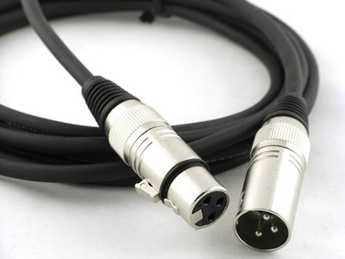Six-String DIY Recordist: Don't Underestimate the Importance of Cables in the Studio

One of the most overlooked areas when it comes to home recording studios is cables.
Many of us take this for granted; after all, a cable is something that just makes possible a connection between one piece of gear to another. In other words, it’s what makes possible the flow of an audio signal. Yet having a knowledge and basic understanding of cables can help play a major part in successfully achieving your sonic goals.
If a cable is noisy, for example, that noise can seep into the recording process and can ruin a perfectly good take or, worse still, turn a good recording into a bad one. Cables can affect one’s tone as well, in minute amounts, so it’s important to have good quality cables and spares available on hand if needed. I’d like to just cover some of the basic elements that one needs to know about cables.
Cables come in a number of different variations, the most common being XLR (three prong, usually your most common microphone cable), TRS (tip, ring, sleeve), TS (tip, ring) and RCA combinations. Cables also come in either balanced or unbalanced.
Understanding the difference between a balanced cable and an unbalanced cable is quite easy, and I hope this explains it as simply as possible. A signal is sent through two conductors or wires (+ and -). An unbalanced cable only has two, tip and sleeve (TS) while a balanced cable has three wires, tip, ring and sleeve (TRS). + and - go to tip and ring.
The sleeve wire is a meshed wire that surrounds the signal wire, thus "shielding" it from interference. The reason the term "balanced" is used instead of the term "shielded," is because that would cause much confusion. The - on an unbalanced cable is often referred to as a "shield" as it is wrapped around the + "tip" wire to somewhat stop noise. So a balanced cable is merely an extra layer of shielding.
So the next time you’re in your studio, take a look at your cables, make sure they’re all in good working order, listen for any untold noise in your signal chain, and if there is any, check your cable lines and make sure the connections are all patched in their proper combinations.
Get The Pick Newsletter
All the latest guitar news, interviews, lessons, reviews, deals and more, direct to your inbox!
Happy recording!
Joe Matera is an Australia-based rock guitarist who has played in countless original and cover bands over the past 20 years. As a solo instrumental artist, his current release is an original guitar instrumental track called "Face Off'," now available on iTunes. He also makes a guest appearance playing a blazing guitar solo on UK thrash metal veterans Atomkraft's cover of the Thin Lizzy classic "Cold Sweat," which is out this summer. He also is a Guitar World magazine contributor. For more info, visit joematera.com.
Joe Matera is an Australian guitarist and music journalist who has spent the past two decades interviewing a who's who of the rock and metal world and written for Guitar World, Total Guitar, Rolling Stone, Goldmine, Sound On Sound, Classic Rock, Metal Hammer and many others. He is also a recording and performing musician and solo artist who has toured Europe on a regular basis and released several well-received albums including instrumental guitar rock outings through various European labels. Roxy Music's Phil Manzanera has called him, "... a great guitarist who knows what an electric guitar should sound like and plays a fluid pleasing style of rock." He's the author of Backstage Pass: The Grit and the Glamour.










